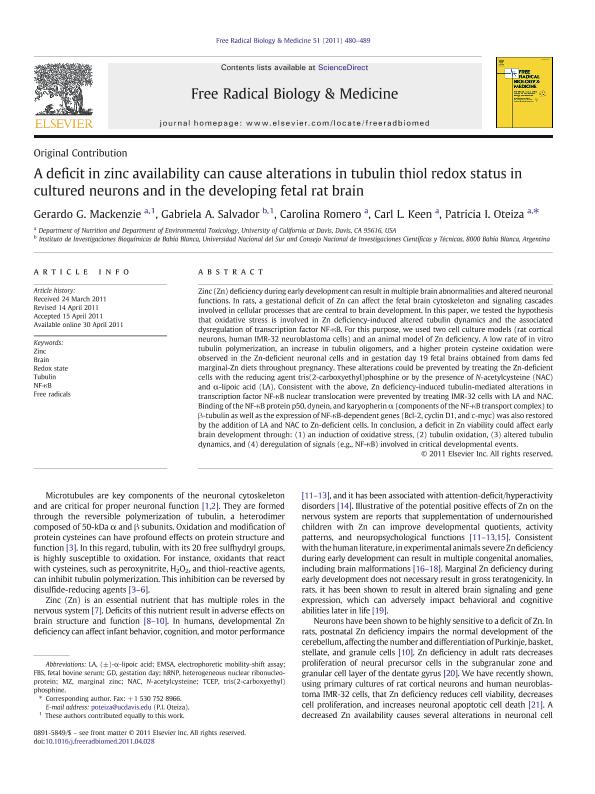Artículo
A deficit in zinc availability can cause alterations in tubulin thiol redox status in cultured neurons and in the developing fetal rat brain
Mackenzie, Gerardo G.; Salvador, Gabriela Alejandra ; Romero, Carolina; Keen, Carl L.; Oteiza, Patricia Isabel
; Romero, Carolina; Keen, Carl L.; Oteiza, Patricia Isabel
 ; Romero, Carolina; Keen, Carl L.; Oteiza, Patricia Isabel
; Romero, Carolina; Keen, Carl L.; Oteiza, Patricia Isabel
Fecha de publicación:
07/2011
Editorial:
Elsevier
Revista:
Free Radical Biology and Medicine
ISSN:
0891-5849
Idioma:
Inglés
Tipo de recurso:
Artículo publicado
Clasificación temática:
Resumen
Zinc (Zn) deficiency during early development can result in multiple brain abnormalities and altered neuronal functions. In rats, a gestational deficit of Zn can affect the fetal brain cytoskeleton, and signaling cascades involved in cellular processes that are central to brain development. In the current paper, we tested the hypothesis that oxidative stress is involved in Zn deficiency-induced altered tubulin dynamics and the associated dysregulation of transcription factor NF-êB.For this purpose, we used two cell culture models (rat cortical neurons, human IMR-32 neuroblastoma cells) and an animal model of Zn deficiency. A low rate of in vitro tubulin polymerization, an increase in tubulin oligomers and a higher protein cysteine oxidation were observed in the Zn deficient neuronal cells, and in gestation day 19 fetal brains obtained from dams fed marginal Zn diets throughout pregnancy. These alterations could be prevented by treating the Zn deficient cells with the reducing agen tris (2-carboxyethyl)phosphine, or the presence of N-acetyl cysteine (NAC) and á-lipoic acid (LA) Consistent with the above, Zn deficiency-induced tubulin-mediated alterations in transcription factor NF-êB nuclear translocation were prevented by treating IMR-32 cells with LA and NAC. Binding of the NF-êB protein p50, dynein and karyopherin alpha (components of the NF-êB transport complex) to â-tubulin as well as the expression of NF-êB dependent genes (bcl-2, cyclin D1 and c-myc) were also restored by the addition of LA and NAC to Zn deficient cells. In conclusion, a deficit in Zn viability could affect early brain development through: 1) an induction of oxidative stress; 2) tubulin oxidation; 3) altered tubulin dynamics, and 4) deregulation of signals (e.q. NF-êB) involved in critical developmental events.
Palabras clave:
Zinc Deficiency
,
Oxidative Stress
,
Neuron Development
,
Tubulin Oxidation
Archivos asociados
Licencia
Identificadores
Colecciones
Articulos(INIBIBB)
Articulos de INST.DE INVEST.BIOQUIMICAS BAHIA BLANCA (I)
Articulos de INST.DE INVEST.BIOQUIMICAS BAHIA BLANCA (I)
Articulos(SEDE CENTRAL)
Articulos de SEDE CENTRAL
Articulos de SEDE CENTRAL
Citación
Mackenzie, Gerardo G.; Salvador, Gabriela Alejandra; Romero, Carolina; Keen, Carl L.; Oteiza, Patricia Isabel; A deficit in zinc availability can cause alterations in tubulin thiol redox status in cultured neurons and in the developing fetal rat brain; Elsevier; Free Radical Biology and Medicine; 51; 2; 7-2011; 480-489
Compartir
Altmétricas



